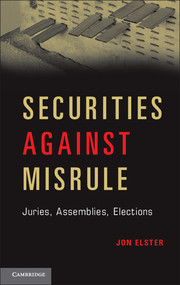Book contents
- Frontmatter
- Contents
- Preface and Acknowledgments
- Introduction
- 1 The Normative Study of Collective Decision Making
- 2 Ignorance, Secrecy, and Publicity in Jury Decision Making
- 3 A Dialogue with Bentham
- 4 The Optimal Design of Constituent Assemblies
- 5 Cross-Voting: A Study in Failure
- Conclusion
- References
- Index
Preface and Acknowledgments
Published online by Cambridge University Press: 05 March 2013
- Frontmatter
- Contents
- Preface and Acknowledgments
- Introduction
- 1 The Normative Study of Collective Decision Making
- 2 Ignorance, Secrecy, and Publicity in Jury Decision Making
- 3 A Dialogue with Bentham
- 4 The Optimal Design of Constituent Assemblies
- 5 Cross-Voting: A Study in Failure
- Conclusion
- References
- Index
Summary
This book grew out of lectures I gave at the Collège de France in 2008–09, 2009–10, and 2010–11. In the first year, I considered collective decision making quite generally, from both a normative and an explanatory point of view. In the present work, the focus is on normative analysis. The topics of the second and third sets of lectures were the Federal Convention in Philadelphia (1787) and the first French Constituent Assembly (1789–91). In this book I draw extensively on the debates in these two assemblies.
A few years earlier, I had become aware of Bentham’s writings on the design of political assemblies. Although I did not immediately recognize their full significance, I have come to believe that Bentham’s negative approach to institutional design – providing securities against misrule – is more robust and realistic than the numerous positive approaches proposed in the literature. Shorn of their eccentric and occasionally ridiculous aspects, his analyses of assemblies and legislation have provided the lodestar for my work. I thank the director of the Bentham Project at University College London, Philip Schofield, for helpful guidance and, more generally, the editors of Bentham’s Collective Works for their superb scholarship. Although most work on Bentham has been devoted to his writings on the law, a few kindred spirits, notably Philippe Urfalino and Adrian Vermeule, have shared my enthusiasm for his work on political decision making. I suspect there is much yet to be mined in Bentham’s writings.
- Type
- Chapter
- Information
- Securities against MisruleJuries, Assemblies, Elections, pp. ix - xiiPublisher: Cambridge University PressPrint publication year: 2013



